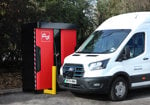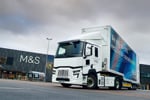Alternative fuels: Can electric vehicles really save the world?
 by Rob Ingram, director, business development, Enterprise Rent-A Car
by Rob Ingram, director, business development, Enterprise Rent-A Car
Electric cars have taken on a new significance.
They were given pre-eminence in the Conservatives’ plans for a low-carbon economy and London mayor Boris Johnson unveiled his ambition to make London “the electric vehicle capital of Europe”.
Electric cars are still struggling to capture the fleet world’s imagination though.
There are some examples where they work, but they may remain too impractical for many fleets.
An effective supporting infrastructure is too far away to make them a viable option for many companies.
We also have to question whether the current electric models meet the needs of many organisations.
With the right investment, though, these problems could still be overcome.
So what should fleet decision-makers do?
Take the plunge and follow Boris into an electric future?
Commit to one of the other alternative fuels out there?
Wait a few months before deciding which technology to adopt?
The truth is there are many options.
No-one knows what course alternative power sources will take.
I think most people agree that ongoing investment in viable alternatives is key – we’ve invested $25 million ourselves to help establish the Institute of Renewable Fuels in the USA.
And the debate around new ways of powering vehicles is a welcome shift in gear.
However, environmental targets still have to be balanced with operational needs and economic realities.
Electric cars may well be the way of the future, but here and now the best choice fleet managers can make is to ensure their fleet makes the most of the viable options currently available.
Telematics: UK telematics market may be at a pivotal point
 by Tony Neill, executive vice-president, Navman Wireless
by Tony Neill, executive vice-president, Navman Wireless
Companies operating commercial vehicles have been the early adopters of vehicle tracking technology and the competitive advantage that these businesses have enjoyed is increasingly making telematics imperative, not just beneficial.
Estimates suggest that between 15% and 20% of fleets currently employ a tracking system, but ominous warnings of sustained economic pressures are forcing businesses to reassess their operational procedures.
It would be no surprise if this leads to rapidly increasing take-up and kick-starts the industry in the company car market.
To date, businesses with car fleets have been left playing catch-up.
This sector currently accounts for less than 2% of the UK telematics industry.
Vehicle tracking enables businesses to optimise journey routes, monitor driver speeds and vehicle usage, and ensure the most appropriate field reps are allocated to customers.
Inevitably employees’ fears and objections will also be overcome as it becomes clear that the systems will help manage road risk and hence protect their welfare.
Where vehicle tracking has been combined with satellite navigation, employers will also be providing staff with a popular employee benefit.
The UK telematics market could very well be at a pivotal point in its development.
As Winston Churchill once famously announced: “The optimist sees opportunity in every danger.”
Fuelcards: Understand fuel spend to effectively manage costs
 by Meryl Gilbert, business development director - fuel, Arval
by Meryl Gilbert, business development director - fuel, Arval
Last week I was negotiating the M25, midway through my regular commute home, when it occurred to me that I’d been doing the same journey for the past decade.
Over the 10 years, putting to one side the time that I have spent behind the wheel, the cumulative cost is significant.
I estimated that I travel around 30,000 miles a year, a figure that has been pretty constant over the 10 years, which would put my total fuel spend at more than £20,000.
I have used a fuel card throughout this period, which means that there is no need for me to rely on guesswork – data from the fuel card shows me the exact volume of fuel that I have used, the cost and the CO2 produced.
It is impossible for any fleet manager to effectively manage fuel costs without first understanding where spend is going.
With this information, mileage can be analysed and fuel cost scrutinised which allows the fleet manager to save money by directing and monitoring drivers.
For example, as a driver I’ve managed my spend by buying fuel from the lower cost sites, avoiding motorway filling stations and lift-sharing to meetings wherever possible so my fuel costs could have been a whole lot higher.
These are all things that a fleet manager should be encouraging their drivers to do, using a fuel card to police their performance.
With fuel making up a quarter of the cost of owning a vehicle it is an area that cannot be ignored.
At a time when budgets are tight and cost savings of any size are valuable, fuel is the area to target, with a detailed fuel policy crucial from a cost and environmental point of view.
















Login to comment
Comments
No comments have been made yet.